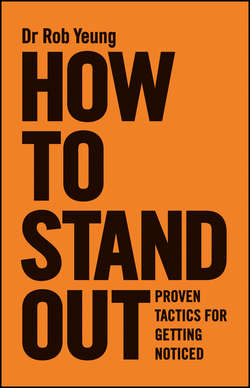Читать книгу How to Stand Out - Yeung Rob - Страница 8
На сайте Литреса книга снята с продажи.
Introduction
Finding techniques that work
ОглавлениеSo why do I want to write this book?
Allow me to introduce myself by telling you what I said at that networking event back in the spring. Remember I had about 50 people watching me and I was allowed only 50 seconds. So I was speaking faster than I would normally do.
I began by saying: “Hi, I’m Rob Yeung, an organizational psychologist, which means that I develop leaders and their teams to do their jobs better by running workshops on leadership, team effectiveness and particular skill topics. For example, I was working on Tuesday with a corporate sales manager and his team at a growing business.
“They do most of their selling to their corporate clients face-to-face. So I was running the second of three workshops designed to help them to present better. To pitch, to get their messages across. To be more memorable and ultimately land more deals. At each session I present a few new principles then the team gets to practise by putting together and then delivering impromptu speeches.”
On that day, I gave just one example of the kind of workshop I’ve run as an organizational psychologist. Actually, I describe myself as an organizational psychologist but you could equally call me a coach, a trainer, a corporate consultant, a keynote speaker, a lecturer. I train managers. I act as a sounding board to business owners. I speak at conferences all over the world to audiences of hundreds or even thousands of people. I lecture at universities and business schools. I work with charities that want to learn to raise funds more effectively. Ultimately, I teach people techniques that will make them better in whatever their walk of life.
Of course there are many books written by consultants. But I hope I’m different from most. I completed a PhD in psychology. So I spent three solid years of doctoral research reading scientific paper after scientific paper as well as getting a few of my own research articles published in technical journals.
We need to have proof about what works and what doesn’t.
The main thing I learnt was the importance of systematic evidence. That we need to have proof about what works and what doesn’t when it comes to recommending practices and interventions that affect people’s lives.
Scientists have long understood that there is something called a “placebo effect”. In medical trials, doctors have discovered they can give patients a sham treatment – such as a pill containing nothing more than common household sugar – and yet some patients will feel better.
As a result, any pharmaceutical company wishing to launch a new drug has to prove it has genuine effects over and above those of a sham treatment. In a carefully controlled experiment, some patients are given the new drug while other patients are given the sham treatment. After perhaps weeks, months or even years, researchers then measure the symptoms of those given the drug (the experimental group) against the symptoms of those given the sham treatment (the control group). Only if those in the experimental group have improved significantly more than those in the control group can the drug be considered a success.
The same test can be applied to the recommendations and rituals proposed by corporate consultants, life coaches and other alleged advisers. After all, if they say that they can change your life, shouldn’t they be able to prove it?
For example, suppose you meet a friend of a friend at a party. She says that she is a hypnototherapist. It’s not just standard old hypnotherapy, she explains. Hypnototherapy is a fantastic new technique which can deliver astonishing results in only a handful of hours. She says that she can hypnotize you into becoming more confident, more engaging and more credible in both your professional and personal life.
She says that it will only take three sessions. And that each session will cost £100.
You pay up. You go along to get hypnotized. And afterwards you feel pretty positive about yourself. But did it really work? Or was it merely a sham treatment which triggered some kind of placebo effect in you? Would you perhaps have been better off spending your £300 and three hours of your time on some other form of coaching or reading books or even just sitting quietly and making plans by yourself, for instance?
In my work as an organizational psychologist, I’m a sceptic. I’m wary of gurus and advisers who claim that they can work miracles. Before recommending anything, I like to have proof. I like to read a research journal and know that a reputable group of scientists at a top university or business school has actually done a study to see what genuinely helped people. So rather than simply telling people what I feel has worked for me personally, I try as far as possible to recommend only techniques that have been revealed by researchers to work for most everyone.
